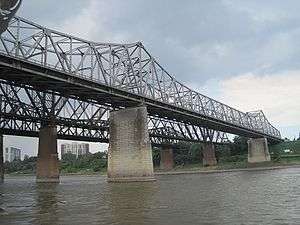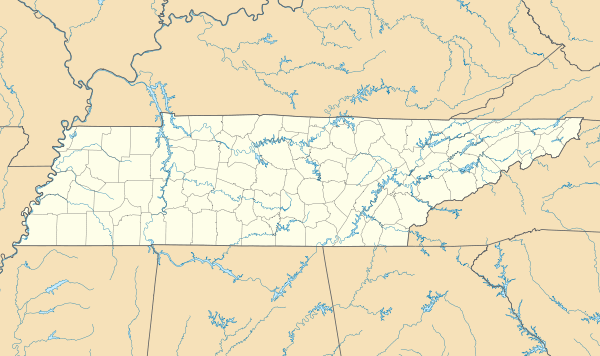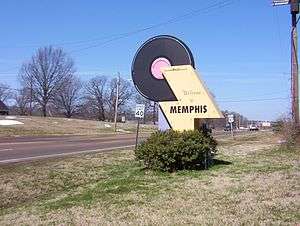Memphis & Arkansas Bridge
The Memphis & Arkansas Bridge (per its nameplates), also known as the Memphis–Arkansas Bridge or Memphis–Arkansas Memorial Bridge, is a cantilevered through truss bridge[2] carrying Interstate 55 across the Mississippi River between West Memphis, Arkansas and Memphis, Tennessee. Memphians refer to this bridge as the "Old Bridge" to distinguish it from the "New Bridge", or Hernando de Soto Bridge, upstream.
Memphis & Arkansas Bridge | |
|---|---|
 Memphis & Arkansas Bridge | |
| Coordinates | 35°7′39.02″N 90°4′32.42″W |
| Carries | 4 lanes of |
| Crosses | Mississippi River |
| Locale | West Memphis, Arkansas and Memphis, Tennessee |
| Official name | Memphis & Arkansas Bridge |
| ID number | 79I00550101 |
| Characteristics | |
| Design | Cantilevered through truss bridge |
| Total length | 5,222 feet (1,592 m) |
| Width | 52 feet (16 m) |
| Longest span | 770 feet (235 m) |
| Clearance below | 112 feet (34 m) |
| History | |
| Opened | December 17, 1949 |
| Statistics | |
| Daily traffic | 62,355 (2016) |
Memphis & Arkansas Bridge | |
  | |
| Location | Memphis, TN |
| Built | 1949 |
| NRHP reference No. | 01000139[1] |
| Added to NRHP | February 16, 2001 |

| |
The Memphis & Arkansas Bridge also carries U.S. Route 61 (US 61), US 64, US 70 and US 79 from Memphis to West Memphis; it also carried US 63 prior to its truncation (and later rerouting) in Arkansas. The western terminus of Tennessee State Route 1 (SR 1) sits on the Tennessee–Arkansas boundary halfway across the bridge.
The bridge consists of five Warren through trusses, each with a length of 790 feet (240 m). Combined with the approach segments, the bridge's total length is 5,222 feet (1,592 m). Completed in 1949, it is the only bridge spanning the Mississippi River designed to carry exclusively vehicular traffic that was built before 1950. It was designed by Modjeski and Desoto, successors to the firm that designed the Harahan Bridge, built in 1916 to carry vehicular and rail traffic.[3] The bridge was listed on the National Register of Historic Places in 2001.[1]
Built before the introduction of the Interstate Highway System, the span was not built to Interstate Highway standards; it lacks the concrete barrier between the different directions of traffic which was added later. It was also built with a sidewalk on either side of the roadway, positioned just outside the steel truss girders. The sidewalks, now also separated from the traffic lanes by concrete barriers, are accessible from Memphis city sidewalks on the Tennessee side, but give way to grassy slopes on the shoulders of I-55 on the Arkansas side.
The sidewalk and bridge is listed as part of the Mississippi River Trail. However, travel is not recommended across the sidewalk and is prohibited on the vehicle traffic lanes of the bridge, as the structure is an Interstate Highway crossing. On August 12, 2012, a cyclist was killed after being struck by a vehicle when using the shoulder approaching the bridge.[4] In 2016, a pedestrian/bicycle path on the neighboring Harahan Bridge made crossing the river safer and eliminated the need to use the I-55 bridge.[5]
On December 23, 2014, numerous news sources reported that the FBI had released an official statement warning local law enforcements of a threat to the bridge during that month. The FBI stated, "according to an anonymous complainant... ISIS instructed an ISIS member, a presumed USPER (U.S. person) in Memphis, with a direct order to blow up the Memphis–Arkansas bridge on an unknown date, activating ISIS terror cells in the United States." Security was heightened, but the threat was later discredited.[6]
See also
- List of crossings of the Lower Mississippi River
- List of bridges on the National Register of Historic Places in Arkansas
- List of bridges on the National Register of Historic Places in Tennessee
- National Register of Historic Places listings in Crittenden County, Arkansas
- National Register of Historic Places listings in Shelby County, Tennessee
References
- "National Register Information System". National Register of Historic Places. National Park Service. July 9, 2010.
- "Memphis-Arkansas Bridge". Bridgehunter.com.
- "NRHP nomination for Memphis & Arkansas Bridge" (PDF). Arkansas Preservation. Retrieved July 23, 2016.
- "Bicycler Killed On Interstate Coming From Work". WREG.com.
- "Harahan Bridge Project".
- Reuters (December 23, 2014). "FBI warns of Islamic State threat to Mississippi River bridge". Chicago Tribune.






